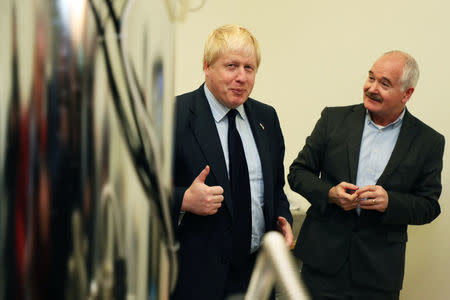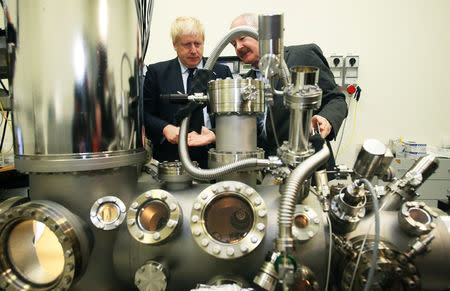Ireland says not ready to let Brexit talks move on to trade
By Padraic Halpin
DUBLIN (Reuters) - Britain and Ireland clashed over Brexit on Friday with Dublin saying it was not ready to allow talks to move on to trade issues next month and London ruling out the much longer transitional period preferred by its neighbour.
The border between EU-member Ireland and Northern Ireland, which will be the UK's only land frontier with the bloc after its departure, is one of three issues Brussels wants broadly solved before it decides in December whether to move the talks onto a second phase about trade, as Britain wants.
Meeting in Dublin, Britain's Foreign Secretary Boris Johnson and his Irish counterpart Simon Coveney struck an amicable tone but remained far apart on several key aspects.
"Yes we all want to move onto phase two of the Brexit negotiations but we are not in a place right now that allows us to do that," Coveney said. "We have very serious issues, particularly around the border, that need more clarity."
He said Ireland's preference was that Britain as a whole would share the same regulations as the EU post-Brexit but if that was not possible, then London effectively needed to commit to allowing a tailor-made solution for Northern Ireland
"In the absence of that, from an Irish persecutive, there is a sense of jumping into the dark," Coveney said.
Speaking before a meeting with his counterpart on the sidelines of a European Union summit in Sweden, Irish Prime Minister Leo Varadkar said Dublin would need those assurances written into the conclusions of phase one.
"What we want to take off the table before we even talk about trade is any idea that there would be a physical border," he told reporters. "Once those parameters are set, then we'd be happy to move onto phase two, provided the other issues are resolved as well."
However Johnson said talks would have to move onto the next stage before the border issue could be resolved as many of the questions around it were bound up with Britain's future customs arrangement with the European Union.
While he said London has absolutely no interest in seeing any kind of hard border, any room for compromise is complicated by the fact that his government are propped up by Northern Ireland's pro-Brexit Democratic Unionist Party, which responded on Friday by saying Dublin was "trying to block" the talks.
"It is clear now that the Irish government are fully signed up with the European establishment to thwart the referendum result in the United Kingdom to leave the EU," DUP MP Sammy Wilson said in a statement.
Johnson added that he understood why Ireland wants a four to five-year post-Brexit transition period for Britain to allow businesses in Ireland time to adjust to any new arrangements, but said this was possible within a much tighter timescale.
(Additional reporting by James Davey in London and Ian Graham in Belfast,; editing by Stephen Addison)

 Yahoo News
Yahoo News 




